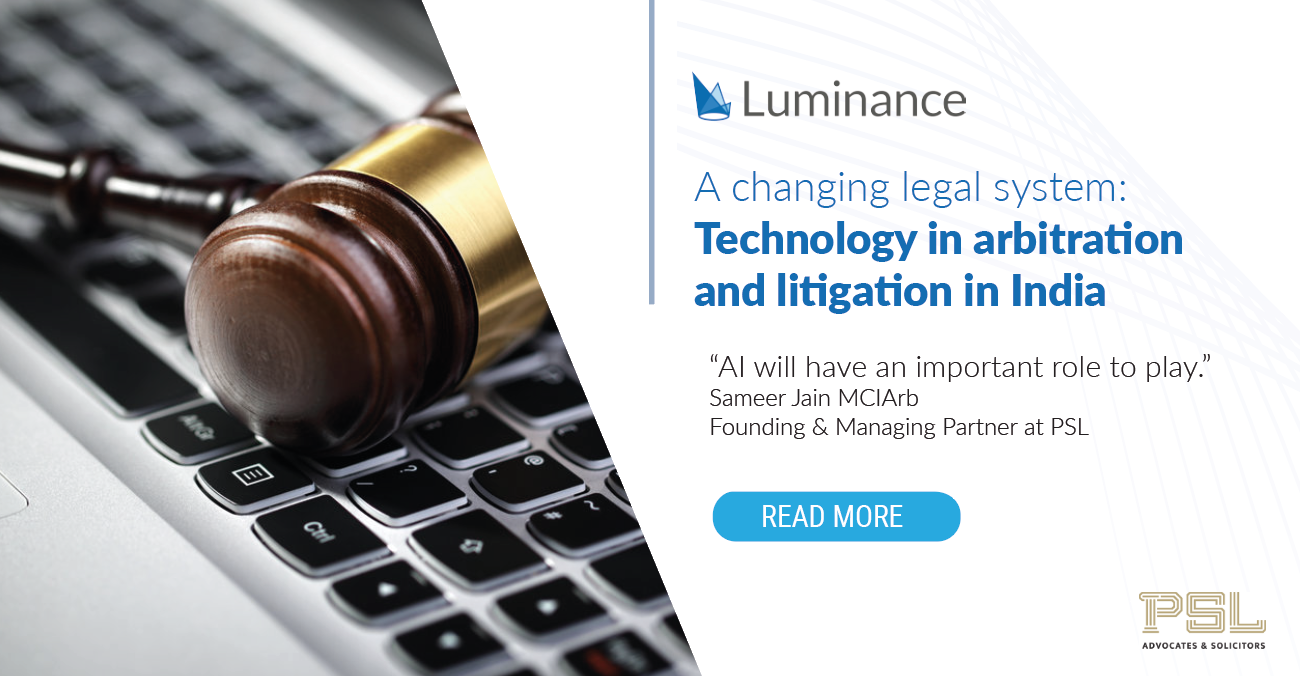
Blog
A changing legal system: AI in Indian arbitration and litigation
19 August 2020 | Luminance
Luminance recently held a webinar with Sameer Jain MCIArb, Founding & Managing Partner, and Anant Gupta, Associate at PSL Advocates & Solicitors, from boutique Indian firm PSL, discussing both how the firm has implemented technology to enhance document review processes during arbitration and litigation, and the wider trends taking place in the Indian legal system more generally.
For many years in India, the dispute resolution landscape has been stepping up its adoption of technology. Courts are becoming increasingly digitised in order to enhance efficiency and accessibility, in turn allowing for immense time-savings and for disputes to be resolved more affordably. Sameer Jain MCIArb, Founding & Managing Partner at PSL, notes that “Certain courts in India now require electronic filing and are absolutely paperless. Technology is being adopted generally across the legal system.” Additionally, a new Personal Data Protection Bill is being discussed in the Indian parliament and this is likely to create a surge in compliance reviews. In order to review the vast data sets involved, whilst also meeting the strict deadlines that data protection regulations frequently impose, Sameer says that “AI will have an important role to play.”
Luminance Discovery is a unique blend of supervised and unsupervised machine learning algorithms that can read and form an understanding of a corpus of documents, breaking down key elements of the data set across a number of interactive, graphic widgets. By quickly understanding what is contained in a dataset, lawyers are best-placed to expand and direct discovery requests early on in the investigation. Sameer Jain explains that “As far as Discovery and research is concerned, technology can make lawyers’ lives much easier.”
PSL recently used Luminance on an arbitration case with a very large data set amounting to 110GB. Anant Gupta, Associate at PSL, notes that it would have been “almost impossible to go through every document with a high level of certainty and we wanted to make sure there was no human error in the review.” PSL decided to opt for Luminance’s innovative AI technology to conduct these reviews as they found they could achieve time savings of 60%. Anant says, “At times, reviewing manually is like finding a needle in a haystack. With a software like Luminance, you just have to type in keywords and search – it’s really efficient.”
With the recent pandemic, many in the Indian legal system have realised that there is an urgent need for AI tools to achieve expedient dispute resolution. Technology is inherently innovative and flexible, allowing Covid-related disputes such as those in lending, credit, property, commerce and retail to be resolved with greater efficiency and confidence. Sameer notes that the current pandemic did contribute to PSL’s decision to adopt Luminance, saying, “We needed a remote collaboration tool as well.” Luminance’s collaborative ‘tasks’ tool allows managers to assign tasks and continually track the progress of their team. Following the review, a report of all notes generated can be passed on to the different teams or team members, the client or even subject matter experts ahead of court trials. Using Luminance’s Hyperlinker tool, team members can automatically hyperlink production references in Word to their original document. This ‘live’ Word document can be shared with colleagues or opposing counsel, who can click on the hyperlink and instantly be taken to the correct document in Luminance.
As the legal landscape continues to evolve in India, technology will play a vital role in allowing lawyers to be more efficient and cost-effective. Using Luminance, Anant says, “We are now able to take our resources and use them on tasks that really matter.”